#dpdpa tools
Text
DPDPA Audit & Significant Data Fiduciaries
Imagine that a company in India, handling digital personal data, fails to comply with DPDPA rules due to its lack of transparent consent processes. So, unfortunately, they become exposed to legal consequences due to non-compliance and may even have to bear hefty fines of up to 250 Cr.
As an organisation, you want to steer clear of any non-compliance issue and an audit can be a lifesaver. It identifies and rectifies such vulnerabilities and protects the company's reputation and builds customer trust.
To put it simply, an audit is a proactive step to maintain data privacy, identify gaps, mitigate legal risks, and enhance your overall business integrity.
In this blog, we bring you everything you must know about DPDPA audits and significant data fiduciaries so you are on the safe side.
What Is The DPDPA Framework?
The DPDP Act 2023 brings us a comprehensive data protection law that's set to protect and safeguard personal data. It has far-reaching implications for businesses operating in the country.

DPDPA places various responsibilities on organisations that handle personal data to protect individuals' privacy and ensure responsible data management practices. This includes:
Getting free, specific, informed, unconditional, and unambiguous consent from individuals before collecting their personal data
Executing robust security safeguards to protect personal data from unauthorized access, accidental disclosure, acquisition, etc.
Granting individuals access to their data, as well as the right to correct, erase, or restrict its processing
In the unfortunate event of a data breach, organisations are obligated to notify the relevant authorities
It's also important to note that non-compliance with the DPDPA can result in penalties up to 250 cr.
Who Are Significant Data Fiduciaries?
In simple terms, a 'data fiduciary' under the DPDP is someone who, either alone or with others, decides why and how personal data is processed. This can include individuals, companies, associations, the government, or any other entity that controls personal data.

If the Central government identifies a data fiduciary or a group of them, they are called a Significant Data Fiduciary.
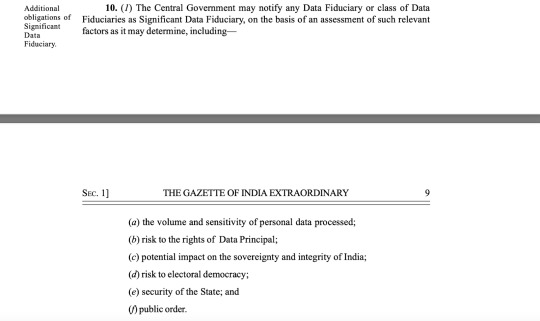
Source: Meity
This decision is based on several factors, including:
The volume and sensitivity of personal data processed
Risk to the rights of the Data Principal
Potential impact on the sovereignty and integrity of India
Risk to electoral democracy
Security of the State
Public order.
Additional Duties of Significant Data Fiduciaries
A Significant Data Fiduciary has additional responsibilities on top of Data Fiduciary duties. This includes:
Appointing a Data Protection Officer (DPO) - The DPO will represent the Significant Data Fiduciary under the provisions of the DPDP Act. However, they must be based in India. The DPO must also report to the Board of Directors or a similar governing body and be the point of contact for grievance redressal
Appointing an independent data auditor - The auditor evaluates the entity's compliance with the law
Conducting periodic Data Protection Impact Assessment (DPIA), which evaluates how personal data is processed, risks to individuals' rights, and other relevant details
Undertaking periodic audits to ensure ongoing compliance
Adopting additional measures as prescribed by law
Why Periodic DPDPA Audits Are Necessary?
A DPDPA audit falls under the additional responsibilities of a Significant Data Fiduciary.
It is mandatory for businesses in India to do a thorough DPDPA compliance audit. This audit can find any gaps in compliance and help take corrective measures to make sure they're following the law.
These audits can be incredibly beneficial, and here’s why you need them.
Regular DPDPA audits help you protect individuals' privacy in compliance with the law
It helps identify potential risks and vulnerabilities in data-handling processes
It lets you take proactive measures to mitigate risks before they become serious issues, such as hefty fines of up to 250 Cr
It helps you assess the effectiveness of existing security measures and identify areas for improvement to enhance overall data security. This, in turn, improves customer trust and brand image
It highlights any gaps or deficiencies in the organisation's data protection practices and offers insights into areas that may require additional attention or resources to prevent data breaches
DPDPA audits allow you to adapt to evolving threats and regulatory changes
Who Needs Regular DPDPA Audits?
It's quite simple. Audits are essential for all types of organisations and industries that handle personal data or have regulatory compliance requirements. However, as per the Digital Personal Data Protection Act, it's a mandate for Significant Data Fiduciaries, as discussed above.

This can include schools, colleges, and universities that handle student and staff information or healthcare providers who handle patients' medical records and sensitive health information. Regular audits ensure compliance, identify and address vulnerabilities, and maintain the security and integrity of the data they handle.
DPIAs and Audits: The Right Tool
Source: DPDP Consultants
Significant Data Fiduciaries are required to conduct DPIAs and regular audits. But this has to be done diligently. So, there is a need to automate the process to ensure all bases are covered while maximizing time and efficiency. These tools minimize human bias and produce a standardized report that streamlines the process.
That said, when it comes to DPIAs, you can switch to a Data Protection Impact Assessment Tool. It automates the entire DPIA process and lets you conduct the assessment almost effortlessly through a user-friendly platform.
With this tool, you can track risks that were identified during the assessment and make sure all concerned individuals are kept in the loop regarding the actions taken to mitigate these risks.
Let's make Compliance Easy
As per the DPDP Act, there are certain obligations you must adhere to when it comes to personal data. And, regular DPDPA audits and DPIAs are one of the duties of a Significant Data Fiduciary. DPIAs and audits help identify and rectify any potential breaches and ensure the lawful and secure processing of personal data.
They are almost indispensable for maintaining trust, avoiding penalties, and upholding a commitment to responsible data handling.
DPDP Consultants brings you a set of tools and services that makes compliance with the DPDP Act easy and streamlined:
Our Data Protection Consent Management tool streamlines the acquisition of valid consent and automates the entire process of managing, tracking, and handling consent requests
The Data Principal Grievance Redressal platform streamlines the process of exercising data rights through a user-friendly interface and improves response efficiency in accordance with the DPDP Act
Our Data Protection Impact Assessment tool aids in the easy assessment and tracking of risks and ensures transparent communication about risk mitigation efforts
Our Data Protection Awareness program allows management to oversee the ongoing and efficient execution of their personal data privacy initiatives
Our Contract Reviews and redrafting services ensure that your business's outsourcing agreements align with DPDPA compliance standards
Through our DPDP Data Protection Officer services, organisations can appoint a third party for process audits so it aligns seamlessly with DPDPA requirements
Our training program for employees caters to organisation-specific needs emphasizes the practical aspects of DPDPA compliance and covers personal data policies, processing activities, and more.
Compliance isn't just about following the law; it's also about building trust and keeping your brand's reputation strong. Treating personal data with care isn't just a legal requirement—it's key to making a digital society that's fair for everyone.
Simplify DPDPA Compliance And Optimise Your Operations!
DPDP Consultants offers comprehensive solutions for personal data privacy and privacy law guidance to ensure compliance.
#dpdp act#dpdp#dpdp act 2023#dpdpa tools#digital personal data protection#dpdpa#dpdp 2023#dpia#dpdp consultants#dpdp tool#DPDPA Audit
0 notes
Text
How To Build Privacy Compliance For India's New DPDP Act?
As soon as the Digital Personal Data Protection Act 2023 was enacted, many companies started efforts to get compliant - from updating privacy policies to tweaking contracts.
But is this enough?
While that's a good start, true compliance involves a deeper commitment. What's needed here is a comprehensive understanding of the law's nuances and implications, along with proactive measures to ensure ongoing adherence. Ahead, we tell you how to build privacy compliance for India's new DPDP Act. Let's dive in!
What Is The Privacy Compliance?
Privacy compliance makes sure that businesses handle an individual's personal data according to the legal regulations of the DPDP Act. This protects the data from any breaches and unauthorized access.
Now, adhering to the regulations is mandatory. It not only protects individuals' privacy but helps businesses avoid heavy legal penalties.
By implementing privacy measures, you build trust with customers, manage risks, and demonstrate commitment to ethical data handling practices.
What Is the Digital Personal Data Protection Act (DPDPA)?
Source: Meity
The Digital Personal Data Protection Act 2023 is India's first privacy law and is defined as an Act to provide for the processing of digital personal data in a manner that recognizes both the right of individuals to protect their personal data and the need to process such personal data for lawful purposes and for matters connected therewith or incidental thereto.
The Digital Personal Data Protection Act 2023 addresses privacy concerns by outlining rules for handling personal data. Similar to the EU's GDPR, it emphasizes consent and data subject rights.
That said, it has distinct features, including specific language, and requirements. The DPDPA mandates that businesses inform users about data processing through a privacy policy. Consent must be informed, meaning users understand what they're agreeing to. Failure to provide proper notice invalidates consent and data processing.
To put it simply, the Digital Personal Data Protection Act 2023 protects personal data by ensuring transparency and enforcing stringent consent standards.
Challenges In Privacy Compliance
Privacy compliance faces various challenges. They include:
Understanding and adhering to diverse regulations of the Digital Personal Data Protection Act(DPDPA) may need a nuanced outlook.
Businesses may struggle with data governance, determining who accesses data and how it's used, while ensuring compliance with laws.
The lack of clear guidelines can make implementation feel complicated and lead to uncertainty and potential legal risks.
Balancing security measures with user accessibility poses a challenge, as overly restrictive policies can hamper user experience.
New technology introduces new privacy concerns, requiring constant adaptation to protect data effectively.
Education and awareness gaps among employees and customers further compound these challenges, stressing the need for comprehensive privacy training programs.
What Must Companies Do To Build Privacy Compliance?
Here are a few things companies can do to build privacy compliance:
Create clear guidelines for all employees and update them regularly to adapt to changing circumstances.
Ensure adherence to policies from top management to down and integrate them into company culture through open communication.
Make policies easily understandable and encourage staff to follow them. Also, address any implementation challenges immediately.
Utilise checklists to help everyone follow procedural requirements and track progress efficiently.
Facilitate easy and clear methodology for responding to Data principal rights and grievance redressal.
Conduct regular training sessions for all staff levels to reinforce understanding of policies and maintain compliance.
Stay up-to-date on evolving laws and regulations and ensure policies remain relevant and compliant with current standards.
Enforce policies consistently across all team members and departments and showcase the importance of compliance in daily operations.
Perform audits periodically to evaluate policy effectiveness, identify areas for improvement, and manage any security gaps.
Use automation tools to streamline compliance processes and maintain consistency.
Privacy Compliance Solutions & Automated Tools
As you can see, building privacy compliance for India's new DPDP Act requires a comprehensive approach. You must understand the law’s intricacies and develop a robust action plan. From conducting Data Protection impact assessments to clear data handling policies, it needs continuous efforts.
DPDPA Consultants bring you all the necessary tools and solutions, which makes privacy compliance with the Digital Personal Data Protection Act 2023 easier. Here's how:
Our Data Protection Consent Management tool enables obtaining valid consent easily and automates consent request handling, ensuring compliance throughout the process.
With Data Principal Grievance Redressal, individuals can effortlessly exercise their data rights through a user-friendly platform, enhancing response efficiency in line with the Digital Personal Data Protection Act 2023.
Simplify the Data Protection Impact Assessments (DPIAs) process with our tool and allow easy risk assessment and tracking, ensuring everyone stays informed about the efforts.
Our Data Protection Awareness program enables management to oversee the continuous execution of their personal data privacy initiatives efficiently.
Ensure outsourcing agreements comply with the DPDP Act through our Contract Reviews and redrafting services.
Our custom training programs address organization-specific needs, emphasising practical aspects of DPDP compliance such as personal data policies and processing activities.
Build Privacy Compliance For DPDPA Today!
Boost your compliance journey with DPDP Consultants. Our comprehensive suite of automation tools and expert services simplifies DPDPA adherence every step of the way.
Contact Us For DPDP Compliance Tools
FAQ
How do you ensure data privacy compliance?
Ensuring data privacy compliance involves several steps such as implementing robust security measures, conducting regular audits, staff training, etc. The right set of strategies is imperative to uphold regulatory standards.
Why is data privacy and compliance important?
Data privacy and protection are important to protect individuals' sensitive information, maintain trust with customers, and avoid legal penalties associated with data breaches or mishandling.
What are the 5 pillars of compliance with the Data Privacy Act?
The five pillars of compliance with the Data Privacy Act include appointing a consent manager, data protection officer, conducting risk assessments, implementing data protection measures, creating a privacy management program, and reporting breaches immediately.
#dpdpa tools#dpia#dpdp act 2023#digital personal data protection#dpdp#dpdp act#dpdp 2023#dpdpa#dpdp consultants#dpdp tool
0 notes
Text
What Is Data Protection Management

Data is incredibly valuable to many companies, and having high-quality data is essential for staying competitive. It then becomes crucial to avoid losing access to your data or letting it get into the wrong hands.
To protect data, companies have built large cybersecurity teams and invested in various tools and solutions. In this article, we'll explore one of these solutions—data protection management—and why it's so important for keeping your business information secure.
Understanding Data Protection Management (DPM)
Data protection management (DPM) involves overseeing the services that safeguard information in a digitised environment. It uses a variety of tools and methods to ensure data protection processes run smoothly.

DPM is like a set of best practices to protect data effectively. In the past, simple infrastructure and basic data protection tools could be managed manually. But now, with cloud services and complex systems, manual management is no longer enough. Companies must deal with scattered data, diverse systems, and data silos, which requires more sophisticated management approaches.
Why is Data Protection Management Important?
It is crucial to actively manage data protection strategies, with continuously changing enterprise systems and security boundaries, and data being created and used rapidly.
Data protection management (DPM) ensures a secure data environment, which builds trust with customers, stakeholders, and partners, and helps prevent data breaches and other security issues. It is also key for meeting regulatory requirements and ensuring that a business can keep running smoothly even when faced with threats.
DPM enhances backup and data protection policies in many ways, including:
Data lifecycle management: Securely handling data from creation to disposal, ensuring protection at each stage.
Handling dispersed data in silos: Establishing unified protection strategies for scattered data.
Implementing data protection policies: Enforcing guidelines for data handling and compliance.
Ensuring regulatory compliance: Aligning data practices with regulations to avoid penalties and reputational damage.
In India The Digital Personal Data Protection Act 2023 (DPDP Act), was recently enacted to provide a comprehensive framework for data protection in India. Non-compliance with the DPDP act can lead to fines of up to 250 crores INR.
What is a data protection management system?
A data protection management system (DPMS) is like a blueprint that helps a company set up a strong data protection setup. It's a place where rules and regulations about handling data in a company are stored.

A good DPMS also makes sure that the company follows the rules and guidelines for data protection in its industry.
A good DPMS should include:
Data protection policies: Clearly defined policies according to relevant regulations and ensure data is only accessed by authorised personnel. Assign a team to oversee data governance and compliance.
Employee training: Regularly educate employees about data protection, the risks involved and data handling procedures.
Incident response plan: Have a detailed plan to manage data incidences breaches, including containment, investigation, and recovery steps.
Data backup and recovery: Implement a strategy to regularly back up data to secure locations and to recover it in case of loss due to hardware failures, ransomware attacks, etc.
Audits and risk assessments: Conduct regular audits and assessments to evaluate the data protection measures in place and identify risks.
Vendor management: If you're sharing data with third-party vendors, ensure they have strong data protection measures in place and enter into a contract with them to maintain security standards.
Data retention and disposal: Establish guidelines for retaining and securely disposing of data.
Tools and technologies: Use appropriate systems to control access to sensitive data.
Continuous improvement: Continuously update the strategies to address new threats and regulations.
Understanding your Organisation's Compliance Readiness
As companies work to keep up with data protection rules and earn customer trust, Privacy Gap Assessments help with the changing regulatory landscape.
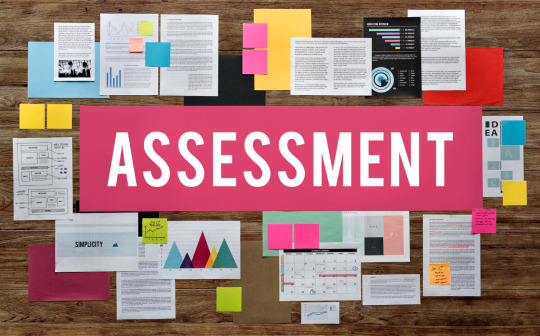
These assessments review how well a company meets privacy standards. They help identify areas that need improvement, guiding the company to align with requirements and take corrective action.
Regular Privacy Gap Assessments are key to maintaining strong compliance. They must be performed:
Before starting a new processing activity
When implementing compliance
In case of regulatory updates, and
During periodic audits.
The DPDPA Readiness Review program, offered by DPDP Consultants, helps organisations understand how the Digital Personal Data Protection Act 2023, will affect all parts of the organisation. A team of industry experts conducts this program, providing detailed insights into the expected changes within the organisation.
These experts are well-versed in tax laws, regulations, and industry standards. They stay updated with the latest tax legislation changes to offer accurate and reliable advice.
DPDPA Compliance with DPDP Consultants
The Digital Personal Data Protection Act 2023, is not just a set of standards; it's a government mandate. Compliance requires a comprehensive framework with policies, regular audits, and assessments.
Complying with the DPDP Act can be tough. Navigating the laws and setting up a data protection management system will need guidance and the right tools.
That's where DPDP Consultants come in. They can guide you, automate processes, and simplify compliance and data management.

DPDP Consultants create customised solutions for your organisation's needs. In addition to the Readiness Review, they provide the skills, tools, and knowledge needed to comply with these regulations effectively.
The Data Protection Consent Management (DPCM) tool, offered as a SAAS model, ensures valid consent, automating personal data consent requests and establishing a robust system for tracking and handling such requests within companies.
For existing contracts, the Contract Review service ensures alignment with DPDP specifications, necessitating revisions when necessary.
They also provide comprehensive DPDPA Compliance Assistance, establishing internal audit frameworks for regulatory alignment.
They assist in conducting DPIAs to assess and mitigate risks in data processing. Their Data Protection Impact Assessment (DPIA) tool automates the process, allowing concerned individuals/DPOs to conduct DPIAs through a user-friendly platform. It tracks identified risks and ensures all concerned are informed about mitigation progress.
The Data Principal Grievance Redressal (DPGR) tool enables data principals to raise their rights through a user-friendly platform, accessed manually or automatically by Data Protection Officers/concerned persons. This reduces response time and ensures compliance.
They offer a training program to educate staff on the new regulation, ensuring DPDP Act compliance. Their Data Protection Awareness Program (DPAP) enables regular and mandatory awareness sessions, followed by assessments and, ensuring every employee understands the DPDP Act and the repercussions of non-compliance.
Build DPDPA Compliance with DPDP Consultants!
Personalised strategies and automated tools for your organisation to understand, manage, and reduce digital personal data risks.
#Data Protection Management#dpdp#dpdp act#dpdp act 2023#dpdpa tools#dpia#digital personal data protection#dpdp 2023#dpdpa#dpdp consultants#dpdp tool#dpdpa 2023
0 notes
Text
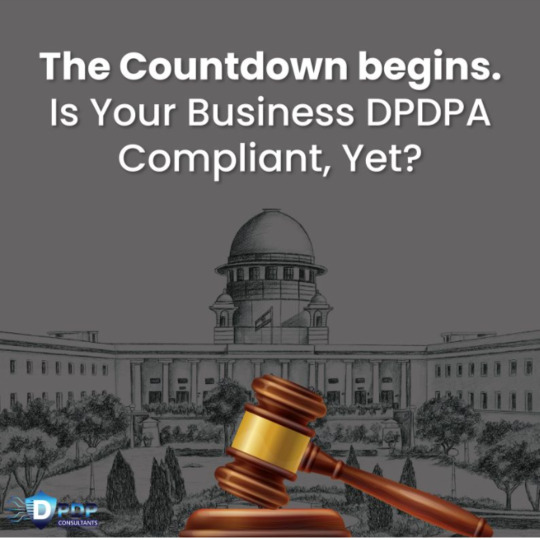
The wait is over. ⌛
DPDP Rules will be out within 100 days of the new government confirms MeitY.
During a recent cabinet meeting, Prime Minister Narendra Modi tasked his ministers with drafting roadmaps for the initial 100 days of his upcoming term. 📌
Here are some changes and updates that were discussed:
🇮🇳 The Union government is gearing up to take significant strides in data protection and cybersecurity within the first 100 days of the next government.
🔒 The long-overdue rules for the Digital Personal Data Protection Act (DPDPA) will be out within 100 days of the new government. These rules will fortify the existing data privacy law and ensure enforcement.
📢 Once the DPDPA rules are notified, a 45-day consultation period will ensue, paving the way for the establishment of a Data Protection Board (DPB).
🤖 Additionally, amendments to the IT rules will target critical areas such as AI-driven misinformation and deep fakes until the comprehensive Digital India Act comes into play.
💡 The Digital India Act, slated to replace the archaic Information Technology Act, will revolutionize cybersecurity, AI, and privacy standards.
The entire data privacy and cybersecurity landscape is changing rapidly. The enforcement of DPDPA will be sooner than you can say COMPLIANCE.
Companies, still have the chance to build proof for DPDPA compliance and take measures to align their personal data processing in accordance with the act.
If you want to get started on your DPDPA compliance journey.
Contact us Today! 💻
#dpdp 2023#dpia#dpdp#dpdp act#dpdp act 2023#dpdpa tools#digital personal data protection#dpdpa#dpdp consultants#dpdp tool#dpdp compliance
0 notes
Text
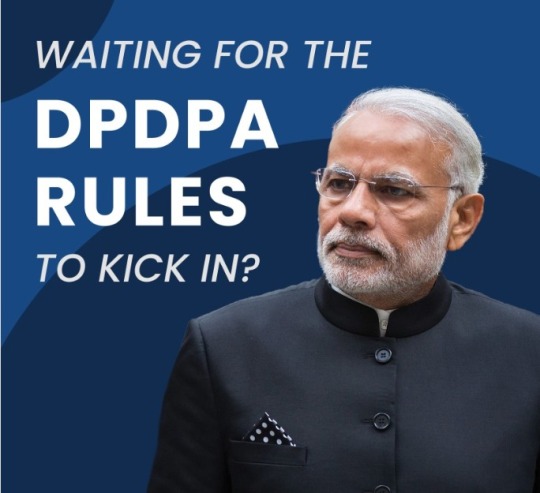


If you're delaying compliance until the DPDPA Rules are released, you're not just risking one penalty, but multiple.
Here's why:
💣 The 𝐥𝐚𝐰 𝐢𝐬 𝐚𝐥𝐫𝐞𝐚𝐝𝐲 𝐢𝐧 𝐞𝐟𝐟𝐞𝐜𝐭. So, from the moment it commenced, until your company achieves compliance, you're non-compliant, leaving you vulnerable to penalties.
💣 Chances are that your company will be found defaulting and 𝐢𝐧𝐟𝐫𝐢𝐧𝐠𝐢𝐧𝐠 𝐧𝐨𝐭 𝐨𝐧𝐞 𝐛𝐮𝐭 𝐦𝐚𝐧𝐲 𝐨𝐭𝐡𝐞𝐫 𝐬𝐞𝐜𝐭𝐢𝐨𝐧𝐬 of the law leading to 𝐦𝐮𝐥𝐭𝐢𝐩𝐥𝐞 𝐩𝐞𝐧𝐚𝐥𝐭𝐢𝐞𝐬.
💣 In case of a breach, you won’t be penalised for just a data breach but for a 𝐝𝐚𝐭𝐚 𝐛𝐫𝐞𝐚𝐜𝐡 𝐨𝐟 𝐮𝐧𝐜𝐨𝐧𝐬𝐞𝐧𝐭𝐞𝐝 𝐝𝐚𝐭𝐚 which is way larger than the penalty for 𝐜𝐨𝐧𝐬𝐞𝐧𝐭𝐞𝐝 𝐝𝐚𝐭𝐚 𝐛𝐫𝐞𝐚𝐜𝐡.
🕑 Clock is ticking. If you’re not DPDPA compliant, you’re walking on thin ice, putting your business and customer trust on the line.
🛡️ Start building your compliance today before it’s too late. Contact us for customized solutions for your business.
#dpdp#dpdp act#dpdp act 2023#dpdpa tools#dpdp 2023#digital personal data protection#dpdpa#dpdp consultants#dpdp tool#DPDPA Law#DPDP LAW#DPDP ACT
0 notes
Text
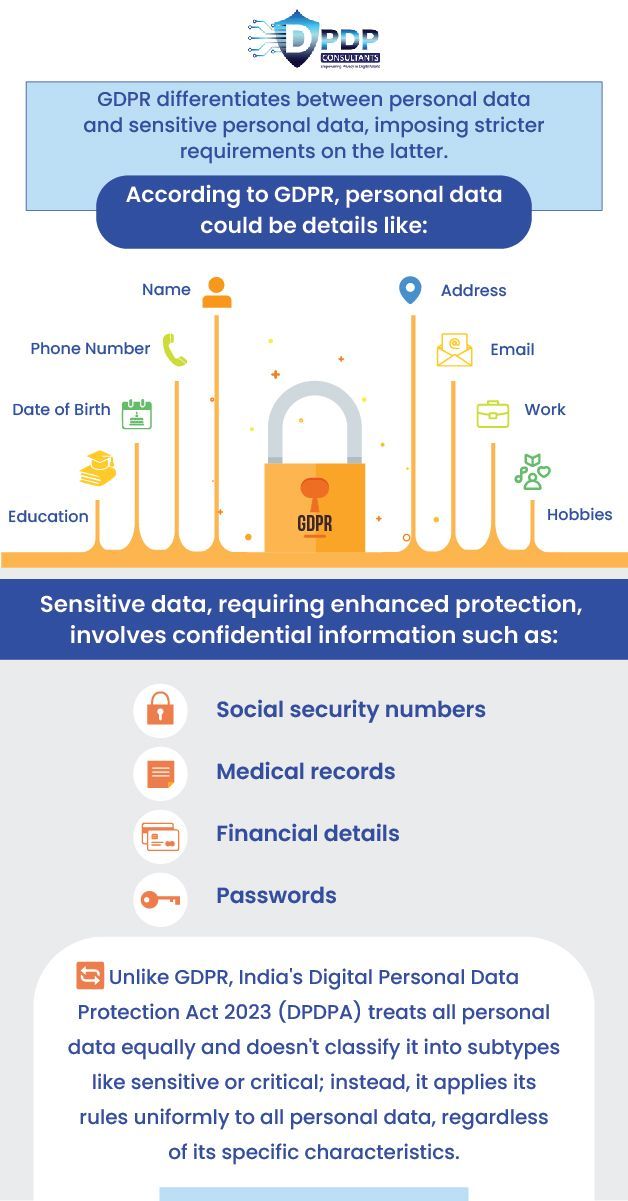
GDPR differentiates between personal data and ensitive personal data, imosing stricker requirements in the latter.
Sensitive data, requiring enhanced protection, involves confidential information
Unlike GDPR, India's Digital Personal Data Protection Act 2023 (DPDPA) treats all personal data equally and doesn't classify it into subtypes like sensitive or critical, instead it applies its rules uniformly to all personal data regualtion of its specific characteristics.
#dpdpa tools#dpia#digital personal data protection#dpdp act 2023#dpdp 2023#dpdp act#dpdp consultants#dpdp#dpdp tool#dpdpa
0 notes
Text
4 DPDPA Tools You Need To Get Compliant
4 DPDPA Tools You Need To Get Compliant
The Digital Personal Data Protection Act, 2023, highlights the significance of protecting personal data in the digital age and makes substantial modifications to India's data protection laws. With these new regulations come obligations for businesses to ensure compliance and protect the privacy and security of Indian citizens' personal data.
In this blog, we'll explore four essential DPDPA tools that can assist your organisation in achieving compliance:
Consent Management Platform
Grievance Redressal System
Assessments and Audits Tool
DPDP Act Awareness Program

Digital Personal Data Protection Act (DPDPA) Compliance Checklist
To ensure that your organisation complies with the Digital Personal Data Protection Act, 2023, take the following steps:
1. Obtain explicit consent
Prior to processing, collecting, using, or sharing personal information, ensure explicit consent is obtained from data principals.
2. Issue Retroactive Consent Notices
Provide retroactive consent notices for any consents obtained before the enactment of the law to ensure transparency and compliance.
3. Manage Data Principal Requests
Respond promptly to data principals' requests to access, correct, update, or remove their personal data to uphold their rights.
4. Conduct Periodic DPIAs
Conduct Data Protection Impact Assessments regularly to assess and manage risks associated with personal data processing.
5. Create DPDP Training Program For Employees
Establish a comprehensive training program to educate and empower employees about their responsibilities under the Data Protection and Privacy Act (DPDPA), reducing the likelihood of non-compliance.
6. Appoint Independent Auditor & DPOs
Appoint independent auditors and dedicated Data Protection Officers (DPOs) to oversee compliance efforts and ensure accountability within the organisation.
These are the basics of building compliance with the Digital Personal Data Protection Act, by doing so, organisations can uphold the data processing hygiene that the DPDPA law mandates.

Tools to Build Digital Personal Data Protection Act (DPDPA) Compliance For Companies
With data privacy regulations becoming increasingly stringent, it's essential for businesses to ensure compliance to protect the personal information of individuals. Let's explore four DPDPA tools and how they can help your organisation build compliance:
1. Consent Management Tool
Getting the data principals' explicit consent is required under DPDPA Section 6. It is necessary to take explicit affirmative action in order for this consent to be freely granted, specific, informed, unconditional, and unambiguous. It should be clear about the data used and the purpose for which the individual has granted consent.

Source: Meity.gov
Notice: A notice must also be sent along with the consent detailing the nature of the personal data, the reason for processing it, the rights of the data principal, and how they may exercise those rights. These notices should be written in plain, easy-to-read language and must include a link to see the notice in any of the languages listed in the Eighth Schedule of the Constitution in addition to English.
Problem: Managing consent requests manually is not only challenging but also prone to manual error leaving gaps in your organisations compliance building efforts.
Solution: An automated Consent Management tool can be used to manage, monitor, and track consent requests.
2. Data Principal Grievance Redressal Platform
Under Section 12 of the DPDPA, data principals have the right to access, update, or delete their personal data. To avoid penalties that go up to INR 250cr, companies need to respond to these requests in a reasonable time frame.

Problem: To fast-track and resolve these data principal requests in time and also have tangible proof as evidence if needed.
Solution: An automated grievance redressal tool enables data principals to assert their rights via a user-friendly platform, managed by DPOs and stakeholders.
3. Automated Data Protection Impact Assessments (DPIAs)
Under the DPDP Act, appointing a Data Protection Officer (DPO) as the central point of contact for all aspects of the act is essential for your role as a Significant Data Fiduciary. The DPOs must conduct periodic Data Protection Impact Assessments (DPIAs) to evaluate and mitigate risks to ensure compliance.

Source: Freepik
A Data Protection Impact Assessment is a structured process created to assist in systematically analyzing, identifying, and minimizing risks related to data protection.
Problem: Small and medium-sized businesses (SMEs) can benefit from using built-in templates, but bigger organisations and Significant Data Fiduciaries (SDFs) need a more reliable and scalable solution to handle the significant processing and gathering of personal data.
Solution: The Data Protection Impact Assessment (DPIA) Tool enables Data Protection Officers (DPOs) to conduct DPIAs, track identified risks, and ensure compliance with regulatory requirements by providing a user-friendly platform.

Source: Freepik
4. DPDP Act Employee Training & Awareness
Under the Digital Personal Data Protection Act 2023, all employees handling personal data on behalf of organisations must understand their responsibilities under the law and also ways to tackle breach in emergencies.
Solution: DPDP Consultants’ Data Protection Awareness Program (DPAP) is a subscription-based DPDPA tool that enables companies to conduct regular and mandatory awareness sessions, followed by assessments.
By fostering a culture of compliance within your organisation, you can minimize the risk of non-compliance and build trust with customers and stakeholders.
Conclusion
Achieving compliance with the Data Privacy and Protection Act (DPDPA) is crucial for businesses operating in today's digital landscape. The four DPDPA tools discussed in this blog offer indispensable support in navigating the complexities of data privacy and protection regulations. These tools empower organisations to handle their data privacy requirements efficiently and automate manual tasks that are prone to error.
By implementing these tools, businesses can streamline their compliance efforts, and foster trust with their customers by demonstrating a commitment to protecting their sensitive information. Investing in robust DPDPA tools is becoming exceedingly necessary as the regulatory environment changes to maintain long-term compliance and protect the integrity of your company's data operations.
Embracing these tools not only helps businesses meet regulatory requirements but also positions them for success in an increasingly data-driven world.
Ready To Automate DPDPA compliance?
Contact DPDP Consultants today to learn more about our innovative tools and services to help secure and make your business DPDP Compliant today.
#dpdp act#dpdp act 2023#dpdp#dpdpa tools#dpia#digital personal data protection#dpdp 2023#dpdp consultants#dpdp tool#dpdpa
0 notes
Text
Best DPDPA Tools to Automate Compliance
The Digital Personal Data Protection Act 2023 marks a significant step for India, introducing its first comprehensive data protection law. This law is designed to protect the personal information of Indian citizens, ensuring their privacy and security in the digital age while also supporting the growth of the digital economy.
For Indian businesses, the DPDP Act introduces several new obligations. Organisations that collect, use, store, or share personal data must comply with these regulations. Failure to do so can lead to severe penalties, including fines of up to INR 250 crore.
To comply with the Privacy Law, businesses must take several key steps:
Obtain Explicit Consent
Issue Retroactive Consent Notices
Manage Data Principal Requests
Conduct Periodic DPIAs
DPDP Training Program For Employees
Appoint Independent Auditor & DPOs
Imagine if there were tools available to streamline, automate, and manage these key compliance aspects of the Indian Digital Personal Data Protection Act. DPDP Consultants offer an all-in-one platform with DPDPA tools designed to help companies efficiently address the critical components of the act.
Let's discuss the compliance requirements under the Digital Personal Data Protection Act 2023, and how these tools can assist users in automating their compliance efforts.
1. Consent Management
Compliance Requirement
Consent management is crucial for complying with the DPDP Act. According to Section 6 of the privacy law, acquiring explicit consent from Data Principals is a must. This consent should be freely given, specific, informed, unconditional, and unambiguous, requiring clear affirmative action. It should specify the data the individual has given consent for and its purpose.
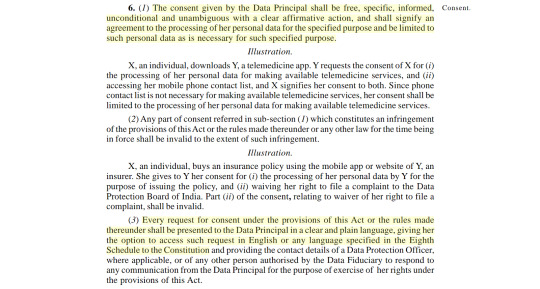
Chapter II; Section 6
Additionally, all consent requests must include a notice detailing the personal data's nature, the purpose of processing, Data Principal rights, and how they can exercise those rights. A similar notice must be provided for all consents collected before the law was enacted.
These notices should be written in clear and simple language, with the option to access the notice in English or any language specified in the Eighth Schedule to the Constitution.
Compliance Solution
DPDP Consultants in India have developed an automated Consent Management tool that handles sending, managing, and tracking all consent requests. Data Protection Consent Management (DPCM) is one of the DPDPA tools that helps in creating notices that align with the act's provisions, making sure your processes remain clear and transparent.

Purpose
This tool, available as a SAAS model, assists businesses in obtaining valid consent.
It automates the management of personal data consent requests.
It establishes a robust system for tracking and handling such requests within companies.
It begins by creating assets for each department and then uploads all the existing information of Data Principals, such as name, email, and phone number. Additionally, it facilitates the creation of privacy notices, required by law to be presented either preceding or accompanying valid consent.
By integrating with the company's mail service provider, the tool efficiently manages valid consents and tracks unconsented personal data.
Moreover, the tool disseminates result information to department managers, Data Protection Officers, and the management team.
Learn More About DPCM
2. Grievance Redressal
Compliance Requirement
According to section 12 of the Digital Personal Data Protection Act 2023, Data Principals have the right to inquire about, correct, complete, update, or request the removal of their personal data from a company's records. These requests must be addressed by the company within a reasonable time frame to avoid penalties.
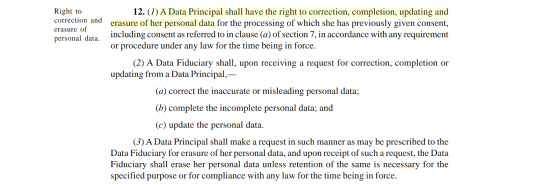
Chapter III; Section 12
Compliance Solution
The automated Data Principal Grievance Redressal (DPGR) tool by DPDP Consultants enables data principals to easily exercise their rights through a user-friendly platform and enables requests to be accessed by Data Protection Officers or concerned persons manually or automatically.

Purpose
Significantly reduces response time to these requests and ensures compliance with government laws.
Monitors unresolved requests and notifies relevant individuals about any delays.
Actively tracks the effectiveness of the Grievance Redressal System and serves as tangible evidence to demonstrate that compliance measures are in place.
Learn More About DPGR
3. Assessments and Audits
Compliance Requirement
As a Significant Data Fiduciary, it's essential to appoint a Data Protection Officer (DPO) to serve as the point of contact for all provisions and independent auditors for data accountability. Additionally, you'll need to conduct periodic Data Protection Impact Assessments (DPIAs) to assess and manage risks.

Chapter II; Section 10 (2)(c)
A DPIA, or Data Protection Impact Assessment, is a structured process designed to help systematically analyse, identify, and minimise risks related to personal data protection.
While having a template can be beneficial for small and medium-sized enterprises (SMEs), Significant Data Fiduciaries (SDFs) and larger organisations require a more robust and scalable approach to manage the substantial personal data handling and collection they undertake.
Compliance Solution
The Data Protection Impact Assessment (DPIA) tool developed by DPDP Consultants enables Data Protection Officers (DPOs) to conduct DPIAs using a user-friendly platform.

Purpose
It tracks risks identified during the assessment.
Makes certain that all relevant individuals are informed about the progress and mitigation of these identified risks.
Learn More About DPIA
4. DPDP Act Awareness
Compliance Requirement
According to the Digital Personal Data Protection Act 2023, Data Principals have the right to inquire, correct, or request the removal of their personal data from company records. To minimise compliance issues, companies must ensure their employees are well-versed in the latest personal data protection laws.

Compliance Solution
The Data Protection Awareness Program (DPAP) is a subscription-based DPDPA tool that enables companies to conduct regular and mandatory awareness sessions, followed by assessments.
Purpose
It makes sure that every employee is well-informed about the DPDP Act and understands the repercussions of non-compliance.
The assessments make certain that individuals take the awareness program seriously and that the results are accessible to all stakeholders.
Learn More About DPAP
All four DPDPA tools discussed are available online through a single console, enabling management to confirm the continuous and effective implementation of their personal data privacy program.
DPDP Consultants Have You Covered
DPDP Consultants lead the way in helping you safeguard your customers' and stakeholders' personal data while meeting the requirements of the Digital Personal Data Protection Act 2023.
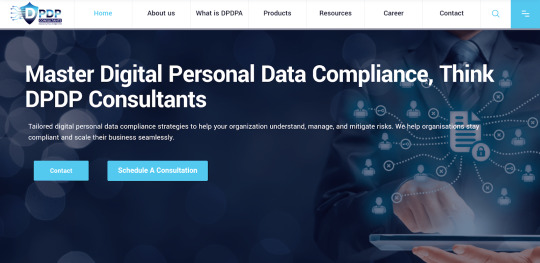
Apart from the DPDPA tools discussed, DPDP Consultants create other solutions to meet your organisation's needs:
The DPDP Act Readiness Review helps organisations understand the impact of the privacy law across all facets of their operations.
Ensuring DPDP Act compliance, our Data Protection Officer (DPO) services empower organisations to appoint a third party for process audits and oversee the implementation of the law.
For existing contracts, our Contract Review service ensures alignment with DPDP Act specifications, necessitating revisions when necessary.
Our dedicated team provides comprehensive DPDPA Compliance Assistance, establishing internal audit frameworks for regulatory alignment.
DPDP Consultants strive to integrate personal data compliance seamlessly into your business operations. This approach ensures legal compliance while also building trust with your customers and stakeholders.
DPDPA Compliance Made Easy With DPDP Consultants!
Use DPDPA tools to automate Digital Personal Data Protection Act 2023 compliance, with the help of DPDP Consultants.
0 notes
Text
Ultimate Guide On DPDPA Audit For Significant Data Fiduciaries
Imagine a company handling personal data fails to comply with DPDPA rules due to its lack of transparent consent processes. So, unfortunately, they become exposed to legal consequences due to non-compliance and may even have to bear hefty fines of up to INR 250 Crores.
As an organisation, you want to steer clear of any non-compliance issue and an audit can be a lifesaver. It identifies and rectifies such vulnerabilities and protects the company's reputation and customer trust.
To put it simply, an audit is a proactive step to maintain data privacy, identify gaps, mitigate legal risks, and enhance your overall business integrity.
Ahead, we bring you everything you must know about DPDPA audits and significant data fiduciaries so you are on the safe side.
What Is The DPDPA Framework?
The DPDP Act 2023 brings us a comprehensive data protection law that's set to protect and safeguard personal data. It has far-reaching implications for businesses operating in the country.
DPDPA places various responsibilities on organisations that handle personal data to protect individuals' privacy and ensure responsible data management practices. This includes:
Getting free, specific, informed, unconditional, and unambiguous consent from individuals before collecting their personal data
Executing robust security safeguards to protect personal data from unauthorized access, accidental disclosure, acquisition, etc.
Granting individuals access to their data, as well as the right to correct, erase, or restrict its processing
In the unfortunate event of a data breach, organisations are obligated to notify the relevant authorities
It's also important to note that non-compliance with the DPDPA can result in penalties up to 250 cr.
Who Are Significant Data Fiduciaries?
According to the DPDP Act, the government has the authority to designate certain Data Fiduciaries or classes of Data Fiduciaries as Significant Data Fiduciaries (SDF). This decision is based on several factors, including:
The volume and sensitivity of personal data processed
Risk to the rights of the Data Principal
Potential impact on the sovereignty and integrity of India
Risk to electoral democracy
Security of the State
Public order.
Additional Duties of Significant Data Fiduciaries
A Significant Data Fiduciary has additional responsibilities on top of Data Fiduciary duties. This includes:
SDFs should appoint a Data Protection Officer (DPO). The DPO will represent the Significant Data Fiduciary under the provisions of DPDPA. However, they must be based in India. The DPO must also report to the Board of Directors or a similar governing body and be the point of contact for grievance redressal.
Significant Data Fiduciaries need to appoint an independent data auditor. The auditor evaluates the entity's compliance with the law.
Significant Data Fiduciaries are required to undertake the following:
Periodic Data Protection Impact Assessment (DPIA), which evaluates how personal data is processed, risks to individuals' rights, and other relevant details
Periodic audits to ensure ongoing compliance
Adoption of additional measures as prescribed by law
Why Periodic DPDPA Audits Are Necessary?
A DPDPA audit falls under the additional responsibilities of a Significant Data Fiduciary. However, they can be incredibly beneficial, and here’s why you need them.
Regular DPDPA audits help you protect individuals' privacy in compliance with the law.
It helps identify potential risks and vulnerabilities in data-handling processes
It lets you take proactive measures to mitigate risks before they become serious issues, such as hefty fines of up to 250 Cr
It helps you assess the effectiveness of existing security measures and identify areas for improvement to enhance overall data security. This, in turn, improves customer trust and brand image.
It highlights any gaps or deficiencies in the organisation's data protection practices and offers insights into areas that may require additional attention or resources to prevent data breaches.
DPDPA audits allow you to adapt to evolving threats and regulatory changes
Who Needs Regular DPDPA Audits?
It's quite simple. Audits are essential for all types of organisations and industries that handle personal data or have regulatory compliance requirements. However, as per the Digital Personal Data Protection Act, it's a mandate for Significant Data Fiduciaries, as discussed above.
This can include schools, colleges, and universities that handle student and staff information or healthcare providers who handle patients' medical records and sensitive health information. Regular audits ensure compliance, identify and address vulnerabilities, and maintain the security and integrity of the data they handle.
DPIAs and Audits: The Right Tool
Significant Data Fiduciaries are required to conduct DPIAs and regular audits. But this has to be done diligently. So, there is a need to automate the process to ensure all bases are covered while maximizing time and efficiency. These tools minimize human bias and produce a standardized report that streamlines the process.
That said, when it comes to DPIAs, you can switch to a Data Protection Impact Assessment Tool. It automates the entire DPIA process and lets you conduct the assessment almost effortlessly through a user-friendly platform.
With this tool, you can track risks that were identified during the assessment and make sure all concerned individuals are kept in the loop regarding the actions taken to mitigate these risks.
Conclusion
As per the DPDP Act, there are certain obligations you must adhere to when it comes to personal data. And, regular DPDPA audits and DPIAs are one of the duties of a Significant Data Fiduciary. DPIAs and audits help identify and rectify any potential breaches and ensure the lawful and secure processing of personal data.
They are almost indispensable for maintaining trust, avoiding penalties, and upholding a commitment to responsible data handling.
DPDP Consultants brings you a set of tools and services that makes compliance with the DPDP Act easy and streamlined:
Our Data Protection Consent Management tool streamlines the acquisition of valid consent and automates the entire process of managing, tracking, and handling consent requests
The Data Principal Grievance Redressal platform streamlines the process of exercising data rights through a user-friendly interface and improves response efficiency in accordance with the DPDP Act
Our Data Protection Impact Assessment tool aids in the easy assessment and tracking of risks and ensures transparent communication about risk mitigation efforts
Our Data Protection Awareness program allows management to oversee the ongoing and efficient execution of their personal data privacy initiatives
Our Contract Reviews and redrafting services ensure that your business's outsourcing agreements align with DPDPA compliance standards
Through our DPDP Data Protection Officer services, organisations can appoint a third party for process audits so it aligns seamlessly with DPDPA requirements
Our training program for employees caters to organisation-specific needs emphasizes the practical aspects of DPDPA compliance and covers personal data policies, processing activities, and more.
Simplify DPDPA Compliance And Optimise Your Operations!
DPDP Consultants offers comprehensive solutions for personal data privacy and privacy law guidance to ensure compliance.
#dpdp#dpdp act#dpdp act 2023#digital personal data protection#dpdpa#dpdp 2023#dpdpa tools#dpia#dpdpa audit#dpdp audit
0 notes
Text
DPDP Act 2023
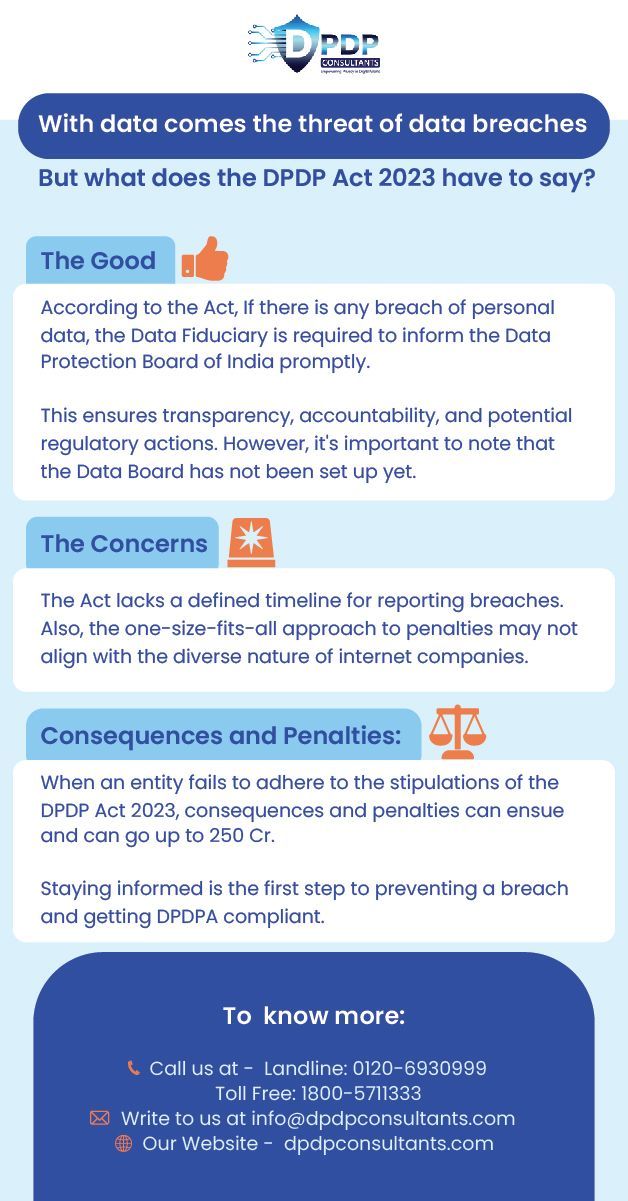
According to the Act, if there is any breach of personal data, the data fiduciary is required to inform the Data Protection Board of India properly.
This ensures transparency, accountability, and potential regulatory actions. However, it's important to note that the data board has not been set up yet.
The Act lacks a defined timeline for reporting breaches. Also, the one-size-fits-all approach to penalties may not align with the diverse nature of internet companies.
When an entity fails to adhere to the stipulations of the DPDP Act 2023, consequences and penalties can ensue and can go up to $250 million.
Staying informed is the first step to preventing a breach and getting DPDPA compliant.
0 notes
Text
4 DPDPA Tools You Need To Get Compliant
The Digital Personal Data Protection Act, 2023, highlights the significance of protecting personal data in the digital age and makes substantial modifications to India's data protection laws. With these new regulations come obligations for businesses to ensure compliance and protect the privacy and security of Indian citizens' personal data.
In this blog, we'll explore four essential DPDPA tools that can assist your organisation in achieving compliance:
Consent Management PlatformGrievance Redressal System
Assessments and Audits Tool
DPDP Act Awareness Program

Digital Personal Data Protection Act (DPDPA) Compliance Checklist
To ensure that your organisation complies with the Digital Personal Data Protection Act, 2023, take the following steps:
1. Obtain explicit consent
Prior to processing, collecting, using, or sharing personal information, ensure explicit consent is obtained from data principals.
2. Issue Retroactive Consent Notices
Provide retroactive consent notices for any consents obtained before the enactment of the law to ensure transparency and compliance.
3. Manage Data Principal Requests
Respond promptly to data principals' requests to access, correct, update, or remove their personal data to uphold their rights.
4. Conduct Periodic DPIAs
Conduct Data Protection Impact Assessments regularly to assess and manage risks associated with personal data processing.
5. Create DPDP Training Program For Employees
Establish a comprehensive training program to educate and empower employees about their responsibilities under the Data Protection and Privacy Act (DPDPA), reducing the likelihood of non-compliance.
6. Appoint Independent Auditor & DPOs
Appoint independent auditors and dedicated Data Protection Officers (DPOs) to oversee compliance efforts and ensure accountability within the organisation.
These are the basics of building compliance with the Digital Personal Data Protection Act, by doing so, organisations can uphold the data processing hygiene that the DPDPA law mandates.

Tools to Build Digital Personal Data Protection Act (DPDPA) Compliance For Companies
With data privacy regulations becoming increasingly stringent, it's essential for businesses to ensure compliance to protect the personal information of individuals. Let's explore four DPDPA tools and how they can help your organisation build compliance:
1. Consent Management Tool
Getting the data principals' explicit consent is required under DPDPA Section 6. It is necessary to take explicit affirmative action in order for this consent to be freely granted, specific, informed, unconditional, and unambiguous. It should be clear about the data used and the purpose for which the individual has granted consent.

Notice: A notice must also be sent along with the consent detailing the nature of the personal data, the reason for processing it, the rights of the data principal, and how they may exercise those rights. These notices should be written in plain, easy-to-read language and must include a link to see the notice in any of the languages listed in the Eighth Schedule of the Constitution in addition to English.
Problem: Managing consent requests manually is not only challenging but also prone to manual error leaving gaps in your organisations compliance building efforts.
Solution: An automated Consent Management tool can be used to manage, monitor, and track consent requests.
2. Data Principal Grievance Redressal Platform
Under Section 12 of the DPDPA, data principals have the right to access, update, or delete their personal data. To avoid penalties that go up to INR 250cr, companies need to respond to these requests in a reasonable time frame.

Problem: To fast-track and resolve these data principal requests in time and also have tangible proof as evidence if needed.
Solution: An automated grievance redressal tool enables data principals to assert their rights via a user-friendly platform, managed by DPOs and stakeholders.
3. Automated Data Protection Impact Assessments (DPIAs)
Under the DPDP Act, appointing a Data Protection Officer (DPO) as the central point of contact for all aspects of the act is essential for your role as a Significant Data Fiduciary. The DPOs must conduct periodic Data Protection Impact Assessments (DPIAs) to evaluate and mitigate risks to ensure compliance.

A Data Protection Impact Assessment is a structured process created to assist in systematically analyzing, identifying, and minimizing risks related to data protection.
Problem: Small and medium-sized businesses (SMEs) can benefit from using built-in templates, but bigger organisations and Significant Data Fiduciaries (SDFs) need a more reliable and scalable solution to handle the significant processing and gathering of personal data.
Solution: The Data Protection Impact Assessment (DPIA) Tool enables Data Protection Officers (DPOs) to conduct DPIAs, track identified risks, and ensure compliance with regulatory requirements by providing a user-friendly platform.

4. DPDP Act Employee Training & Awareness
Under the Digital Personal Data Protection Act 2023, all employees handling personal data on behalf of organisations must understand their responsibilities under the law and also ways to tackle breach in emergencies.
Solution: DPDP Consultants’ Data Protection Awareness Program (DPAP) is a subscription-based DPDPA tool that enables companies to conduct regular and mandatory awareness sessions, followed by assessments.
By fostering a culture of compliance within your organisation, you can minimize the risk of non-compliance and build trust with customers and stakeholders.
Conclusion
Achieving compliance with the Data Privacy and Protection Act (DPDPA) is crucial for businesses operating in today's digital landscape. The four DPDPA tools discussed in this blog offer indispensable support in navigating the complexities of data privacy and protection regulations. These tools empower organisations to handle their data privacy requirements efficiently and automate manual tasks that are prone to error.
By implementing these tools, businesses can streamline their compliance efforts, and foster trust with their customers by demonstrating a commitment to protecting their sensitive information. Investing in robust DPDPA tools is becoming exceedingly necessary as the regulatory environment changes to maintain long-term compliance and protect the integrity of your company's data operations.
Embracing these tools not only helps businesses meet regulatory requirements but also positions them for success in an increasingly data-driven world.
Ready To Automate DPDPA compliance?
Contact DPDP Consultants today to learn more about our innovative tools and services to help secure and make your business DPDP Compliant today.
#dpdp act#dpdp#dpdp act 2023#dpdpa tools#dpdp tool#4 dpdpa tools#Data Principal Grievance Redressal#Grievance Redressal#Data Protection Consent Management#Data Protection Impact Assessment#Data Protection Awareness Program#DPDPA TOOLS#digital personal data protection#dpcm#dpis#dpap
0 notes
Text
Why Do Businesses Handling Personal Data Need DPDP Training?

In the current digital landscape, where concerns regarding data privacy are paramount, it is imperative for businesses to understand and comply with regulations such as the Digital Personal Data Protection Act (DPDPA) of 2023.
This act, which is aimed at safeguarding personal data in the digital sphere, necessitates thorough training for employees to ensure compliance.
In this blog, we will discuss the fundamentals of DPDP training, as well as its scope, significance, and what makes a good training course, along with a list of recommended courses to consider.
What is The Digital Data Protection Act (DPDPA)?
Enacted in 2023, the Digital Personal Data Protection Act (DPDPA) is a crucial legislative framework designed to protect individuals' personal data in the face of the tremendous developments of the digital era. Its primary objective is to establish comprehensive guidelines and regulations governing the collection, processing, and storage of personal data by businesses and organizations.
According to the DPDPA, organizations must have strict policies to safeguard people's right to privacy and stop third parties from accessing, disclosing, or abusing their personal data.
The DPDPA aims to establish responsibility among enterprises and build customer trust and confidence in the management of their sensitive data by enforcing stringent compliance standards.

Source: Freepik
Scope of DPDPA Compliance Training
DPDPA compliance training covers a wide range of topics, including a thorough comprehension of the Digital Personal Data Protection Act (DPDPA) and its implications for businesses. It involves educating employees on their responsibilities regarding data protection, including collecting, processing, and storing personal data in accordance with the law.
Best practices for data handling, risk assessment, and incident response are also covered in the course.
Organizations may establish a culture of data protection within the workplace, maintain compliance with DPDPA rules, and reduce the risk of data breaches by providing staff with the appropriate information and skills.
Looking for the best DPDP Training & Awareness Program?
From training, and guidance to automated tools and everything in between.
DPDP Consultants offers specialised solutions to get compliant with India's new privacy law.
Contact DPDP Consultants For More Info!
Why Do Employees Need DPDP Training?
Fostering a culture of data protection within an organization requires effective training. It lowers the possibility of unintentional non-compliance by ensuring that every employee is aware of their responsibilities under the Digital Personal Data Protection Act (DPDPA).
The danger of data breaches and illegal access is reduced since trained staff members are better suited to handle sensitive data safely. Furthermore, spending money on training builds the organization's reputation, builds confidence with stakeholders and consumers, and shows a dedication to data protection.
Lastly, maintaining regulatory compliance and protecting personal data depend greatly on having workers who have received the necessary training.
What Constitutes a Good DPDPA Training Course?
A good DPDPA training course should cover the following key aspects:
1. Comprehensive Content: All relevant topics, such as risk management techniques, data handling protocols, and legal requirements, should be included in the course content.
2. Engaging Delivery: Training sessions should be interactive and engaging, utilizing various formats such as videos, case studies, and quizzes to enhance learning effectiveness.
3. Practical Examples: Employees may better grasp how to implement DPDPA concepts in their daily duties by using case studies and real-life scenarios.
4. Customization: Training programs tailored to the specific needs and industry of the organization ensure relevance and applicability to employees' job functions.
5. Expert Instruction: The training should be led by experienced instructors who are well-versed in DPDPA and its implications for businesses. Guest speakers or industry experts may also be invited to their insight into specific aspects of DPDPA.
6. Ongoing Updates: Since data privacy rules are ever-evolving, it is important to keep personnel educated through training that offers updates on best practices and legal changes.
7. Assessment and Certification: Assessments at the end of the training enable organizations to gauge employees' understanding, while certification validates their compliance proficiency.
8. Continuous Learning: Provision for ongoing training and updates to keep employees abreast of evolving regulatory requirements and emerging threats.

Source: Freepik
Organizations can ensure that their staff members have the knowledge, skills, and support they require to successfully navigate through the challenges of data protection compliance by taking these factors into account when choosing a DPDPA training program.
List of DPDPA Training Courses that We Recommend
1. DPDPA Essentials: An introductory training that covers the fundamentals of the DPDPA and is appropriate for staff members in all departments.
2. Advanced Data Protection Practices: An in-depth course focusing on advanced data protection strategies, ideal for IT professionals and data security specialists.
3. DPDPA Compliance for Management: Senior management and decision-makers should receive focused training that emphasizes the importance of leadership in maintaining organizational compliance.
4. Cybersecurity Awareness Training: An additional cybersecurity basics course to strengthen DPDPA training and improve data protection initiatives overall.
Conclusion
It is not only legally required but also strategically critical for organizations to invest in high-quality DPDP training if they want to increase consumer trust and reduce the risk of data breaches.
By prioritizing employee education and fostering a culture of data privacy, organizations can demonstrate their commitment to ethical data-handling practices and safeguard the personal information entrusted to them.
In conclusion, DPDP training positions companies for long-term success in a world that is becoming more and more data-driven by laying the groundwork for strong data security procedures and regulatory compliance.
Take Charge of Your Data Protection Journey Today!
Join our DPDP Awareness Program (DPAP) and empower your team with the knowledge and skills needed to navigate the complexities of data protection.
Access the DPDP Awareness Program Here!
0 notes
Text
A Guide On Understanding DPIAs under the DPDP Act
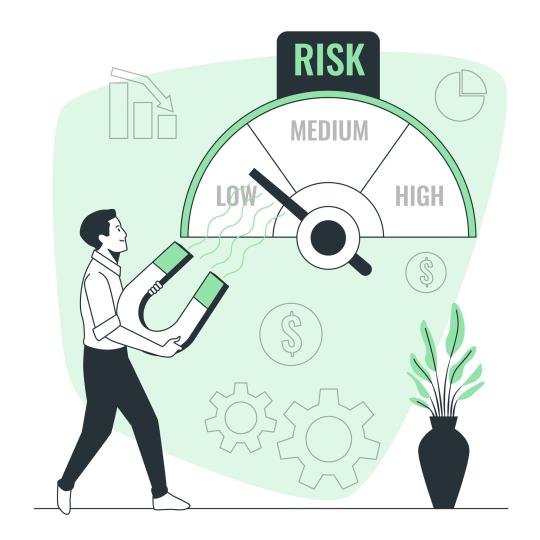
In this day and age where data flows freely, the Digital Personal Data Protection Act 2023 (DPDPA) shields us against personal data misuse. It mandates that companies maintain specific privacy regulations to keep personal information safe and process it ethically as prescribed in the Act.
One such requirement is DPIAs or Data Protection Impact Assessments. These assessments are essential to ensure compliance with the privacy laws. They not only help businesses assess risks and mitigate them but also support building privacy compliance. So ahead, we bring you everything you must know about DPIAs. Let’s get started!
What Is DPIA?
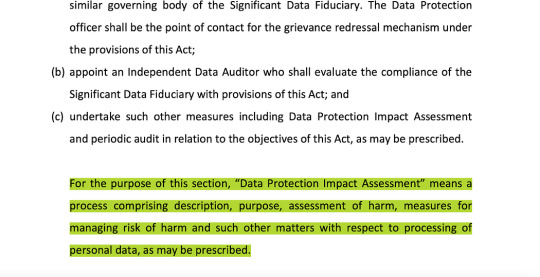
Source: Meity
To put it simply, a Data Protection Impact Assessment (DPIA) is a systematic procedure used to evaluate and manage the risks associated with the processing of personal data.
This structured process begins by clearly describing the nature and purpose of the data processing activities. By doing so, it helps you identify and understand the potential privacy implications and risks related to the handling of individuals’ personal information.
The DPIA serves as a crucial tool for ensuring that data processing activities adhere to legal and ethical standards, provide transparency, and help mitigate any identified risks to individuals’ privacy.
Why Do Organizations Need Data Protection Impact Assessment (DPIAs)?
It doesn’t matter if you are a micro business or a multinational conglomerate, DPIA is for everyone. Here are all the reasons why you need it.
1. Compliance with Data Protection Regulations
Imagine you are a tech company that has recently launched a new app. Here, to navigate through the privacy risks, you can conduct a risk assessment to understand if there are any risks associated with the personal data of individuals that you’ve collected and manage them well in advance.
Conducting DPIAs ensures that organizations comply with data protection regulations. Many jurisdictions require DPIAs, mainly for high-risk data processing activities. It helps identify and address potential privacy risks. By performing DPIAs, organizations can show their commitment to respecting individuals’ privacy rights, avoiding legal penalties, and building trust with users.
2. Proactive Risk Identification and Mitigation
Let’s say, you run a hotel that has come up with a new records system to store customer data. But how do you know if you comply with the law? Running Data Protection Impact Assessments can help you identify any gaps and curb any risks.
DPIAs enable organizations to proactively identify and mitigate privacy risks associated with their data processing activities. By evaluating potential harms and implementing measures to manage risks, organizations can prevent data breaches, unauthorized access, or misuse of personal information. This proactive approach not only safeguards individuals’ privacy but also protects the organization’s reputation and builds confidence among consumers and stakeholders.
Are Your DPIAs Slipping Through The Crack? You Need An Automated Tool To Help Manage & Mitigate Risks!
Get Started With A DPIA Tool!
Who Needs To Conduct DPIAs Under The DPDP Act, 2023 And How Often?
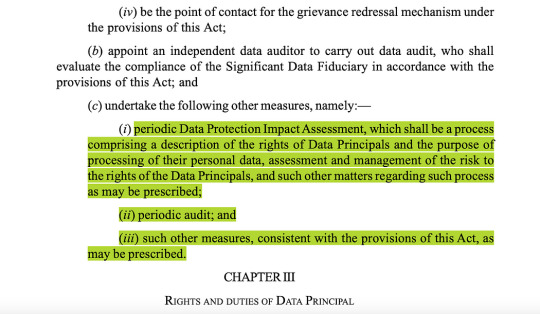
Source: Meity
According to the Digital Personal Data Protection Act 2023 (DPDPA), DPIAs are mandatory and must be carried out by every Significant Data Fiduciary and should be conducted before every data processing project.
Typically, organizations should conduct a Data Privacy Impact Assessment initially within the first three to six months. The focus here should be on evaluating the current privacy stance and establishing a framework.
Regular assessments must be done every six to twelve months and can involve policy updates, Data Privacy Impact Assessments for high-risk operations, and the implementation of consent management and breach reporting systems.
Next, for periodic reviews spanning twelve to twenty-four months, you can use automation tools to make these tasks easier. You can also get external certifications to demonstrate ongoing adherence. Doing these checks regularly helps organizations keep up with changing rules and ensure they are protecting people’s information as they must.
Is There A Tool To Help Manage DPIAs In India?
As mentioned, DPIA is a process designed to analyze and minimize risks associated with handling personal data. To align with the Digital Personal Data Protection Act 2023, companies are obligated to conduct regular DPIAs.
Although this requirement is specifically for Significant Data Fiduciaries (SDFs), it is recommended for all organizations to engage in this practice as it ensures you are handling the data responsibly and also helps avoid hefty fines levied due to non-compliance.
Most companies already have a process or a format to conduct DPIAs but just like any other traditional/manual approach, human error can cause details to slip through the cracks, causing non-compliance in the long run.
To make it easier, DPDP Consultants are here with a robust tool, which automates Data Protection Impact Assessments.
People in charge or Data Protection Officers (DPOs) can use the user-friendly platform to analyze and reduce risks related to personal data. It also keeps track of any threats and makes sure everyone involved comprehends the steps being taken to minimize them. This efficient automation helps you follow the Digital Personal Data Protection Act 2023 rules and keep personal data safe.
DPDP Act Compliance = Dodging Hefty Fines Up To 250cr
While the Digital Personal Data Protection Act 2023 is a great step in the right direction, the data privacy rules may seem complicated. With the risk of data breaches rising, organizations need to take proactive steps to safeguard people’s privacy. And, DPIAs can help maintain compliance and ensure you are on the right path, and dodge penalties up to 250cr.
But don’t worry, we are here to help you navigate through the complexities of the Digital Personal Data Protection Act 2023:
The DPDPA Readiness Review helps in understanding the impact of the DPDPA on all operational aspects of an organization
To ensure compliance, organizations can utilize our Data Protection Officer (DPO) services, engaging our experts for audits and overseeing DPDP implementation
For current agreements, our Contract Review service guarantees compliance with DPDP specifications and offers necessary revisions as required
Our dedicated team provides comprehensive assistance for DPDPA Compliance by appointing internal audit frameworks to align with regulations
The DPDPA Training program underscores the practical implications of policies and provides effective compliance education for all employees
Our Data Protection Impact Assessment (DPIA) tool automates the process and assists in identifying and mitigating privacy risks associated with projects and policies
Elevate Your Organization’s DPDP Compliance
with DPDP Consultants
DPDP Consultants specialise in providing comprehensive end-to-end solutions for personal data privacy. From initial consultations to guiding you through your first audit, we offer continuous support along with cutting-edge automation tools to streamline your compliance efforts effectively.
Get In Touch With Us Today
0 notes